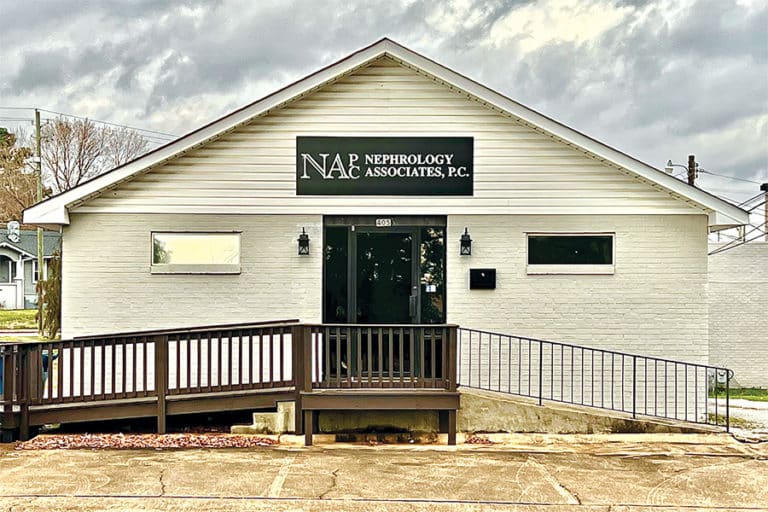Pictured above is Nephrology Associates, P.C., at location on 405 South 2nd Street in Gadsden. (Taylor Spradley/Messenger)
There have been amazing scientific medical advances in medicine in recent years. For example, a non-smoking acquaintance in his 40’s was diagnosed with metastatic lung cancer several years ago. Instead of a life expectancy of six months or so, he is living very comfortably while taking a pill specifically designed for his cancer, for which he had a genetic predisposition.
These incredible and transformative breakthroughs have been seen in many fields of medicine, but unfortunately, advancements in treatment for patients with kidney disease have lagged behind.
Due to the cost and complexity of care of patients with kidney disease, one area of innovation for which kidney disease care is becoming a proving ground is care delivery. Patients with chronic kidney disease are generally very medically complex, with higher rates of heart disease, cancer and even gastrointestinal bleeding than the general population. They have significant care coordination needs focused on preventing worsening of kidney disease, preparation for kidney transplant and, unfortunately, preparation for dialysis when appropriate.
All of these facets of care require extensive and iterative education. There are many appointments required with various specialists at many different facilities (for which patients require something as simple as transportation). Patients with kidney disease often require very extensive and complex medication regimens. Well-intentioned and hard-working nephrologists cannot provide all this support alone. Deficiencies in support and care lead to worse outcomes for patients, increased hospitalizations and significantly greater cost to the healthcare system as a whole.
CMS and private insurance companies are acutely aware of these problems. As a result of a combination of the Affordable Care Act of 2010 and the Executive Order Advancing American Kidney Health of 2019, in addition to a change in eligibility for Medicare Advantage plans for patients with End-Stage Kidney Disease (ESKD), we now have an opportunity to partner with both CMS and private insurers to make radical changes to our care delivery models in an effort to increase support, education and care for patients with kidney disease, and doing so will almost assuredly lower costs.
The phrase being used for these changes in care delivery is value-based care. There are a number of healthcare companies attempting to provide some of these services via care management systems run primarily by nurses and other support staff, often remotely, and rarely in partnership with a patient’s physician.
In our case, Nephrology Associates. P.C., prefer a phrase that is less catchy but more accurate: physician-driven and patient-centered care. It is physician-driven because nephrologists will be taking responsibility and financial risk for every facet of their patients’ care. It is patient-centered because every medical decision we make in partnership with our patients will be guided only by what is best for those individual patients. I would like to think that all of us as physicians have always made decisions for patients based only on what is best for them. In a fee-for-service system, however, we must all recognize that distorted incentives exist that affect how patients are cared for.
Along with 16 other practices nationwide, our practice has partnered with Evergreen Nephrology to provide physician-driven, patient-centered care to our patients in need. Over the next several years, we expect to provide these expanded services to a majority of our ESKD and advanced CKD patients.
We will be doing home visits, providing mental health support services where needed and addressing transportation limitations, education and patient engagement, food insecurity, early support and education for transplant services and medication review and education, just to name a few facets of care we will provide.
Using data analytics and other advancements in information technology, we will be accessing all of a patient’s available electronic health information and leveraging that access and predictive modeling to identify issues and intervene for the highest-risk patients to make their lives better. We will be heavily focused on disease prevention and stabilization to reduce the number of patients who are forced to start dialysis or undergo transplantation.
For those patients who worsen despite our best efforts, we will be helping to coordinate kidney transplantation when possible, and hopefully before a patient ever needs dialysis. For those patients who are forced to start dialysis, we will be highly focused on Home Dialysis modalities that have equivalent outcomes to standard in-center dialysis, but much better quality of life scores at a lower overall cost.
It is a very exciting time in nephrology as a result of these care delivery innovations. Our programs began for a relatively small number of patients on January 23, 2023, and we hope to increase those numbers dramatically over the next several years. I feel certain that our efforts will yield better, happier and healthier lives for our patients, and I can’t wait to see to see the results.
Submitted by Nephrology Associates. P.C.





